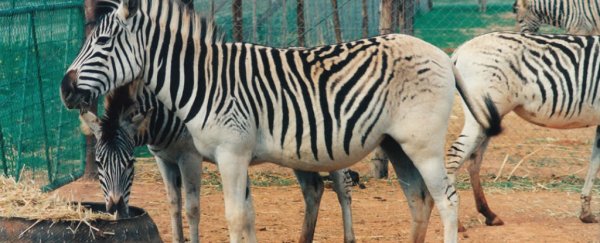Back in 1883, after having their population decimated by 19th century hunters, the very last quagga - a South African sub-species of zebra that doesn't have stripes on its hind legs - died in a zoo in Amsterdam. Now, over a 100 years later, scientists claim they've finally brought the dead sub-species back to life over a 30-year period of selective breeding.
The project, aptly dubbed The Quagga Project, started 30 years ago when its founder, Reinhold Rau from the University of Cape Town, analysed a series of DNA samples from quagga skin. When the results came back, he was shocked and elated to find that the extinct creature was genetically the same as the zebra, which meant that quagga were not a completely separate species. Knowing this was vital, because it proved that the only true difference between a zebra and a quagga were the markings.
With this information, Rau set about reviving the species by selectively breeding zebras to bring forth more and more quagga qualities. The main difference between the two creatures is that the quagga's stripes fade from black and white to solid brown or white the closer you get to its hind legs. In a way, a 19th century quagga looked like a zebra that sat in mud up to its naval.
Now, after 30 years of breeding, the team claims that the quagga are back in action. It took five generations to bring about a creature that expresses all of the same traits as an old quagga did. Since the DNA of zebras and quagga are the same, the team says this latest generation has, in fact, revived a previously extinct animal.
"To all intents and purposes they are the quagga back again. The project has been a complete success," said one of the researchers, Eric Harley.
Despite how cool the project sounds, there are many critics that claim it interferes with nature and is a publicity stunt at its core. In response, the team points out that they didn't use any sort of genetic engineering to bring back the quagga and that the project is intended to right the wrongs of past hunters and bring back a native South African animal that was wrongly killed off.
However, the team has agreed to call the new animal Rau-quagga instead of quagga, to set it apart, which they hope will stem the criticism.
One of the coolest things about the project is that these new quagga are not infertile like many other creatures that researchers have cooked up with breeding practices. This is because, unlike 'zorses' and 'zonkeys', Rau-quagga are not hybrids. Instead, they are an actual sub-species and have retained their genes allowing them to successfully mate with each other.
The team hopes to keep the project going to eventually create a real herd of Rau-quagga so they can once again roam South Africa like their predecessors did in the 19th century.
